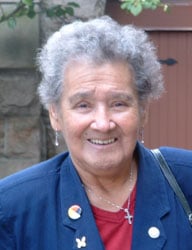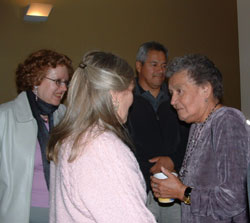As well as being the dramatic story of a residential schools survivor, the video Topahdewin: The Gladys Cook Story, has proved to be a catalyst in helping people who were sexually abused to speak out about their abuse.

“The responses to the video, have been so overwhelming for me,” said Gladys Cook, who is featured in the Anglican Video production. “Most of the women who watched the video have identified something they have carried with them for a long time and I feel proud that my story has moved them to speak out about their abuse, and that for me is the beginning of a healing process.”
Topahdewin: The Gladys Cook Story is a multi-faceted production by Anglican Video senior producer Lisa Barry that relates the story of the woman’s life in the context of residential schools and how they affected the children sent there.
The program was produced by the Anglican Church of Canada as part of an initiative to memorialize the experiences of residential schools survivors. The church agreed to do this when it signed an agreement with the federal government ending litigation over the church’s role in running the schools.
Ms Cook who will be 76 in August, not only survived the school, where she was raped at the age of 9, but went on to rediscover a profound faith that acknowledges both Christian and native spirituality, and to carve a distinguished career as an alcohol and drug abuse counsellor.
Since its premier in Winnipeg, the Gladys Cook Story has been screened at different General Synod committee meetings, and by some dioceses. “Our goal is to have every diocese have a screening of the video,” said Ms. Barry.
There has been a flood of requests for copies of the documentary, by law firms, libraries, educational institutions and other non-governmental organisations to use in their different areas of work.

“We have done several videos of residential schools in the past, but the Gladys Cook Story has made a great impact to people at different levels in society,” said Ms. Barry. “Despite the setbacks, Gladys is a pinnacle of hope and courage for people who watch the video and relate to her story,” she added.
People of all ages have come to the different screenings. However it is not just former residential school survivors or indigenous women who are triggered to speak out about their abuse, “but also non-indigenous women who have been sexually abused feel the need to speak out,” said Ms. Cook.
Because of the emotions that are brought out after the screenings, Ms. Barry suggests a chaplain be present to take time to listen to women who feel the need to speak out.
The video is accompanied by a study guide that gives a brief description on how it should be used and offers some prayers that can be used. Rev. Lavern Jacobs, a former indigenous ministries coordinator for General Synod, produced the study guide.
“Everyday I get phone calls from women seeking counselling, and they all tell me how brave and strong I have been to tell my story, but I encourage them that there is a first step in everything. It took me 40 years to finally speak out and begin a healing process,” said Ms. Cook
Ms. Cook’s contributions to society have earned her a Governor General’s Award and a Canada 125 medal, among many other accolades. Most recently she received the “Grandmothers leaders in the Community award” from her community of Portage La Prairie and this month, she will receive the Order of Manitoba.
This fall the video will be shown on Vision Television. Copies of the video can be purchased from the Anglican Book Centre; a DVD costs $34.95 and a VHS costs $29.95.
For further information and requests for screening please contact:
Lisa Barry
Senior Producer, Anglican Video
Tel:416-924-9199 ext. 295
Email: [email protected]
Interested in keeping up-to-date on news, opinion, events and resources from the Anglican Church of Canada? Sign up for our email alerts .
